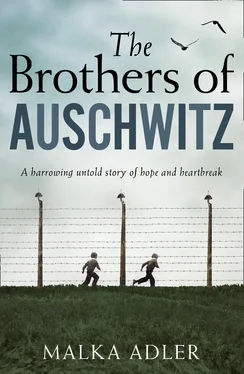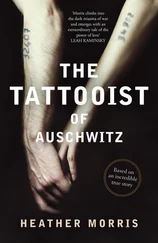I’d see and couldn’t believe my eyes. Goy soldiers would come to buy a horse from a Jew. The horse is lame. The Jew hits the horse on the second leg and hammers a nail into the hoof of the healthy leg, the horse looks healthy. The soldiers pay good money for the horse, the Jew spins around them like a happy top, offering cookies and tea, chatting away as if to friends. The goy soldiers say goodbye, goodbye, set off on their way, and then, boom. The horse falls. The goy soldiers curse the Jew. The goy soldiers kick a stone, seize a stick and break it on the back of the poor horse. The soldiers say, we’ll kill you, dirty Jew, we’ll hang you from the highest tree, filth. Ah. Holding my head, I ran away. That evening I told father and he nodded his head and said nothing.
Goy comes to a Jew in our village. Goy asks, lend me ten agorot – cents – for a bit of tobacco. A Jew lends it to him. How many bits does he return? He returns a lot. Or, instead, a Jew says to a goy, give me some beans, potatoes, cabbage. Goy brings more and more and the Jew isn’t satisfied. Sometimes Goy went to market, wanted to buy a nanny goat. He has no money. He came to a Jew and asked for money. How would he give it back? He’d return two nanny goats. That’s how a Jew exploited the goy. Goy didn’t understand trading. Jew ran the market. Goy looked after the goods. Jew paid Goy at the end of the day. But the goy waited for evening. Yes, yes. He waited for the Jew on his way home. With friends. Five. They hid behind a hill with sticks, knives and an iron rod in their hands. Yaakov approaches in his cart. He has small, red ears and ginger hair. There are two other Jews on the cart. One an uncle, the other a neighbor. One snores loudly, another farts. Yaakov is happy. His bag is filled with money. He hid it under the hay. On the hay he placed a sack of flour, over the sack a blanket. In his pocket he has a little money. Suddenly, a fire in the middle of the road. A small fire, just a small one. The horse stops. Three goys jump on Yaakov, one catches the horse’s bridle. The fifth jumps on the uncle and the neighbor. They had no time to wake up. The money was gone.
Then there was lame Friedman. He brought a mill to thresh goy farmers’ wheat in the village. He’d make a noise throughout the entire village, turrrr turrr turrr. Half the village worked around Friedman’s mill. Farmers would bring their wheat, thresh it, and how would they pay Friedman? It was divided up – one third to him, two thirds to the farmer. Friedman wasn’t a cheat. Friedman had bought the machine, prepared it for the month of May, fixed it, threshed the wheat, he justifiably took percentages. But Jews also had a mill. The goy would bring a ton of wheat to the mill. The goy would go home with two hundred kilos of flour. Isn’t that thieving? A little.
The Jew was smart. The Jew lived at the goy’s expense. Jews always had money in their pockets, they bought a hat, boots, a good coat, fresh fruit, like this, as open as my hand. Maybe that’s why the goys hated Jews. They always called us, dirty Jew, go to Palestine, there’s nothing for you in our country.
We were an ordinary family. We weren’t rich. Father was a trader and a butcher. There was no scarcity of food, but life was hard. They didn’t always buy father’s goods. Sometimes father would go to market with a cow and return two days later with the same cow. And if he did manage to sell it, he didn’t return home alone because of the robbers. Father always walked around town with a brother, an uncle or a friend. He traveled in a group. Sometimes he traveled in an old taxi with five or six people. The taxi barely went thirty kilometers an hour, they’d crank up the car more and more, sometimes they’d spend half a day cranking it. In the meantime, they’d drink coffee, play some cards, and they stuck together. Because of the robbers. Jews were uneasy everywhere. A Jew either existed or not, depending on the desire of the goys.
The goys always said: It’s the nature of the Jew to cheat the Christian.
And I tell you: The Jew had no choice. He had no land. He had to be a trader. The goy had land. The goy always had food in his hands. The goy grew pigs in the yard, cows, geese, he had vegetables in the garden, trees full of apples, a field of wheat and cabbage and corn. The Jew had no land, how was he supposed to live? The goy needed sugar, flour, oil, kerosene, clothing, so the Jew opened a grocery, a bakery, and a clothing store. Sometimes, in order to buy at the store, the goy sold a cow to the Jew. They’d negotiate, but not for business. The goy sold the cow to take products home.
The goys needed the Jews to advance in life. Without the Jews’ money they couldn’t have bought a cow or a horse, they couldn’t have bought a plow to plow the field, or wheat seed for bread. The Jews’ money rolled business forward, so what, did it help us? The Germans also needed the Jews for their business, before they decided to throw them into the oven.
Israel, 2001
14:18 at Nahariya Train Station.
I’m on the interurban to Binyamina. On the seaside. The change to the suburban train is in an hour and seven minutes. I look at the window and see a round face in the glass, a silly smile. Maybe because of the Arak in the grapefruit juice. Arak and grapefruit juice goes well with meatballs said Yitzhak and filled my glass for the second time. Dov smiled, saying, very true, drink, drink, let’s make a toast. To the life of the State of Israel. L’chaim. L’chaim . To life. To life.
Beyond the window high risers pass, country homes, a date avenue, a fierce green in tiny plots, diagonal furrows, and sea, sea, sea, sea. The froth on the waves is the color of mud. The Mosque and wall are a soft cream color. And again housing units, again the sea. The air-conditioning on the train is pleasant.
Opposite me sits an old man covered in age spots. One across half his cheek. He’s wearing an Australian cap with the design of a duck. Beside him is a curly-headed little girl with a ponytail tied with a blue band. She’s licking a record-sized candy on a stick with her red tongue. The old man points to a picture in the book and says, kangaroo, that’s an Australian kangaroo, and he swallows a yawn. The little girl puts the book aside. The old man pulls his cap down to the end of his nose, falls asleep.
I need the toilet. Don’t want to get up. I stand. My bladder is bothering me. Taking my bag, I look for the toilet. The cubicle is at the end of the carriage, near the steps. I peep in, it’s like a plane toilet, a large roll of paper under a plastic lid, a tiny sink, a box of hand wipes, it looks clean.
I don’t move.
Well, get a move on, go in. Wait. I check the door. Mentally take the lock to pieces, turn it to the left, turn it to the right, an ordinary lock. I go into the cubicle and am afraid to close the door in case I get stuck going out. And if I shout for help, will they hear me? No one will. If Yitzhak was on the train, he’d say, worst case scenario, you could jump, with a little luck you’d get to a hospital, most important of all, no one dies from that, and in any case, I’ve already said, taxi, taxi. Dov would say, you only die once, best to hold it in.
The nightmare doesn’t end: The toilet door doesn’t open. In a cinema, for instance. The movie ends. The audience leaves the hall, the lights are switched off, I’m inside. A faded, peeling door, behind a gas station. No one around. An office block, top floor, middle floor, the worst is a basement floor, never happened to me? It’s happened, it’s happened. The walls were like a sealed room. Two minutes and your blouse is wet.
If Yitzhak was there, he’d say, at least you’ve got paper to wipe yourself, we had no paper. And there was nothing to wipe. Dov would say, what paper, we had nothing, we’d cut small pieces from the stripes on the trousers and shirt to wipe. In secret. Sometimes we didn’t even have that. We’d walk in a line, with a stinking, sticky drip down our trousers, don’t even want to think about it. Do you have any idea of what it’s like to walk along a road and feel a disgusting drip into your shoes, better you never know. And now, coffee.
Читать дальше












